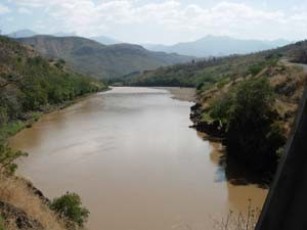European Bank halts financing Ethiopia’s controversial power project
July 24, 2010 (ADDIS ABABA) — As protests from various green campaigners grew to stop the Gibe III hydroelectric dam project in Ethiopia, the European Investment Bank (EIB) said it has dropped the funding environmental and social impact studies for the project.

A number of international environmental groups, among others, International Rivers, Survival International, the Counter Balance Coalition, and the Friends of Lake Turkana, have been calling upon the European Investment Bank; the World Bank, and the African Development Bank to refrain granting funds for the completion of the project.
The power project is being constructed along the country’s Omo River, which is one of the major tributaries supplying some 80pc of the water to Lake Turkana of Kenya.
The groups have claimed that the construction of the Gibe III dam in Southern Ethiopia has adverse environmental impact and seriously affects the lives of communities that depend on Lake Turkana for existence and they insist an immediate stop to the project.
Ethiopia however has dismissed claims saying that Gibe dam construction will decrease the water flow to Lake Turkana; instead it argues that it may even increase the water level due to less water evaporation effect and won’t have an effect on the nature of the local eco-system.
The Gibe III dam, now 35% completed, is costing about $1.7 billion and is expected to generate 1,800 megawatts upon completion in 2013.
The Gibe III dam is one, among the many Hydro power projects the country is building to alleviate power shortages caused from the country’s rapid economic growth.
As a secondary benefit, Ethiopia plans to export excess power to neighbouring countries, including Kenya, Sudan and Djibouti. It will also consider a 26-kilometre undersea transmission line for exporting electricity to Yemen via Djibouti.
According to Ethiopian Electric and Power Corporation (EEPCo), the horn nation will begin selling power to Sudan in September. Supplies to Sudan will amount about 200 megawatts, while 150 megawatts may also be sold to Djibouti should there be sufficient supplies.
(ST)
